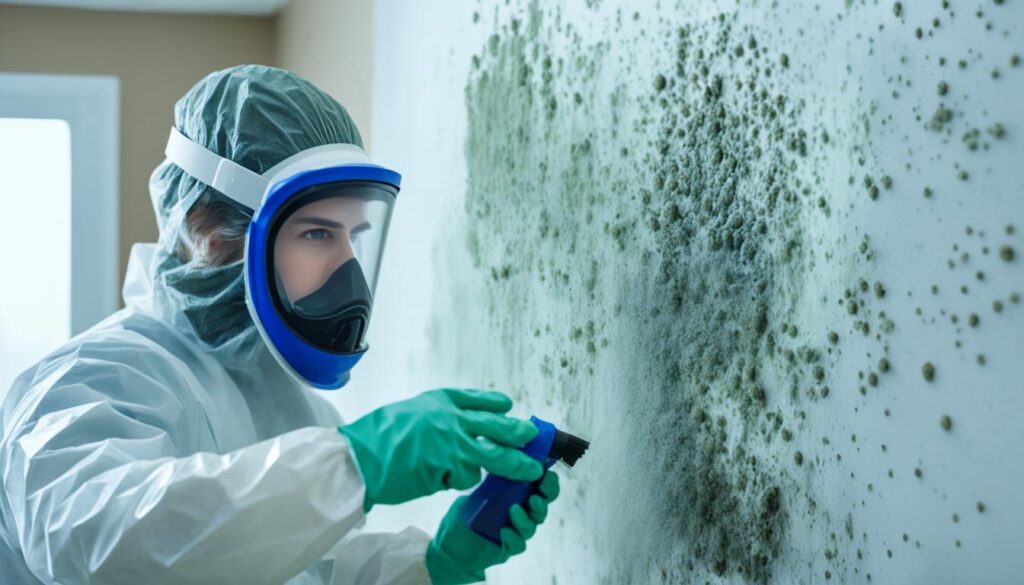
Dangers of Breathing in Mold – Health Impacts
Mold can be a hidden danger lurking in our homes, workplaces, and other indoor spaces. Breathing in mold can have significant health risks and consequences on our well-being. In this section, we will explore the potential dangers associated with mold exposure and the impact it can have on our health.
When mold spores are inhaled, they can trigger respiratory issues, allergies, asthma attacks, and even infections. Mold exposure has been linked to a range of health problems, particularly for individuals with pre-existing respiratory conditions or weakened immune systems. The consequences of prolonged mold inhalation can be severe and long-lasting.
Protecting yourself and your loved ones from the hazards of mold is essential. By taking proactive measures, you can minimize your exposure and maintain a healthy living environment. Throughout this article, we will discuss the necessary steps you can take to prevent mold growth, assess potential contamination, and remediate the issue effectively.
Key Takeaways:
- Breathing in mold spores can lead to respiratory issues, allergies, asthma attacks, and infections.
- Prolonged mold inhalation can result in chronic illnesses and weaken the immune system.
- Mycotoxins produced by mold can have adverse effects on the body.
- Regular mold assessments and prompt remediation are crucial for maintaining a healthy living environment.
- Seek professional assistance for mold prevention and remediation when necessary.
Understanding the Health Risks of Mold Exposure
When it comes to mold exposure, being aware of the potential health risks is crucial. Breathing in mold spores can have detrimental effects on our respiratory system and overall well-being. It is important to understand these risks and take appropriate actions to protect ourselves and our loved ones.
The Impact on Respiratory Issues
Mold exposure can significantly worsen existing respiratory conditions or even trigger new ones. The inhalation of mold spores can irritate the airways and lead to a range of respiratory issues such as coughing, wheezing, shortness of breath, and chest tightness. Those with asthma or allergies are particularly susceptible to these negative effects, as mold can exacerbate their symptoms and make them more severe.
Allergic Reactions and Sensitization
For individuals who are allergic to mold, exposure can cause a range of allergic reactions. These may include sneezing, runny or stuffy nose, itchy or watery eyes, and skin rashes. Continued exposure to mold can also result in sensitization, where the body becomes increasingly sensitive to the allergens present in mold spores. This heightened sensitivity can lead to more pronounced allergic reactions with each subsequent encounter.
Increased Risk of Asthma Attacks
People with asthma are at a higher risk of experiencing asthma attacks when exposed to mold. The inhalation of mold spores can trigger inflammation in the airways, causing them to constrict and making breathing difficult. These asthma attacks can be severe, requiring immediate medical attention and treatment.
“Mold exposure can have serious consequences, particularly for individuals with respiratory conditions such as asthma. It is imperative to create a safe and mold-free environment to prevent the onset of respiratory issues and maintain good health.”
Potential for Infections
In certain cases, mold exposure can lead to infections, especially in individuals with weakened immune systems. Some molds produce toxins called mycotoxins, which can have harmful effects on the body’s immune response. These toxins can compromise the immune system’s ability to fight off infections, making individuals more susceptible to respiratory infections and other illnesses.
To gain a better understanding of the health risks associated with mold exposure, let’s take a look at an informative table:
| Health Risks | Description |
|---|---|
| Respiratory Issues | Includes coughing, wheezing, shortness of breath, and chest tightness |
| Allergic Reactions | Can cause sneezing, runny or stuffy nose, itchy or watery eyes, and skin rashes |
| Asthma Attacks | Inhalation of mold spores can trigger severe asthma attacks |
| Infections | Mold exposure can weaken the immune system, increasing susceptibility to respiratory infections |
By being aware of the potential health risks associated with mold exposure, individuals can take proactive measures to minimize their exposure and protect their respiratory health. Regular inspection and prompt remediation of mold-contaminated areas are essential in maintaining a safe and healthy living environment.
Consequences of Prolonged Mold Inhalation
Prolonged exposure to mold inhalation can lead to detrimental consequences on overall health. It is important to understand the potential risks and take necessary steps to mitigate them. Here, we will explore the various implications of prolonged mold exposure, including the development of chronic illnesses, the impact of mycotoxins on the body, the weakening of the immune system, and the possibility of experiencing neurological symptoms.
1. Development of Chronic Illnesses
Prolonged exposure to mold can contribute to the development of chronic illnesses. Individuals with preexisting respiratory conditions or weakened immune systems are particularly susceptible. Mold spores can trigger inflammation in the airways, leading to persistent respiratory issues such as asthma attacks, allergic reactions, and recurrent infections.
2. Impact of Mycotoxins on the Body
Mycotoxins, toxic substances produced by certain types of mold, can have adverse effects on the body. When inhaled over a prolonged period, mycotoxins can enter the bloodstream and affect various organs, including the liver, kidneys, and reproductive system. They have been associated with immune suppression, hormonal imbalances, and even cancer in some cases.
3. Weakening of the Immune System
Mold inhalation can weaken the immune system, making individuals more susceptible to infections and other illnesses. The constant exposure to mold spores can stress the immune system, leading to a compromised defense mechanism against pathogens. This can result in frequent respiratory infections, prolonged illness recovery, and a general decline in overall health.
4. Possibility of Experiencing Neurological Symptoms
Studies have suggested a potential link between prolonged mold exposure and neurological symptoms. Mold toxins can affect the central nervous system, leading to cognitive impairments, memory problems, mood disorders, and headaches. Individuals with prolonged exposure may experience difficulties in concentration, coordination, and overall cognitive function.
It is crucial to address and mitigate the consequences of prolonged mold inhalation to protect one’s health and well-being. Seeking professional assistance for mold remediation, improving indoor ventilation, and maintaining proper cleanliness can help reduce the risks associated with mold exposure.
| Consequences of Prolonged Mold Inhalation | Key Points |
|---|---|
| Development of Chronic Illnesses | – Mold exposure can lead to persistent respiratory issues and infections |
| Impact of Mycotoxins on the Body | – Mycotoxins from mold can affect organs and lead to immune suppression |
| Weakening of the Immune System | – Mold inhalation weakens the immune system, increasing susceptibility to infections |
| Possibility of Experiencing Neurological Symptoms | – Prolonged exposure to mold may result in cognitive impairments and mood disorders |

Protective Measures for Mold Prevention and Remediation
Preventing mold growth and minimizing exposure are crucial for maintaining a healthy living environment. By implementing the following protective measures, you can effectively combat mold and ensure the well-being of yourself and your loved ones.
1. Conduct Regular Mold Assessments
Regular mold assessments are essential for identifying and addressing potential mold issues early on. Hiring a professional mold inspector can help detect hidden mold growth, assess the severity of the problem, and provide valuable insights for remediation.
2. Keep Indoor Moisture Levels in Check
Mold thrives in moist environments. To prevent mold growth, ensure proper ventilation in bathrooms, kitchens, and other areas prone to humidity. Install exhaust fans and use dehumidifiers to maintain optimal moisture levels indoors.
3. Address Water Intrusion and Leaks Promptly
Water intrusion and leaks provide the ideal conditions for mold to grow. Fix any plumbing issues, roof leaks, or foundation leaks as soon as they are identified. By promptly addressing these problems, you can prevent mold from taking hold in your home.
4. Enhance Air Circulation
Poor air circulation can contribute to the growth of mold. Place furniture and belongings at a distance from walls to allow air to flow freely. Use fans, open windows, and air conditioning to improve ventilation and reduce moisture buildup.
5. Clean and Dry Water-Damaged Materials
If you experience water damage from a flood, burst pipe, or any other source, it’s crucial to clean and dry affected materials within 24-48 hours. Remove water-soaked carpets, furniture, and belongings, and thoroughly dry the area to prevent mold growth.
6. Dispose of Mold-Infested Materials Properly
If you discover mold-infested materials during remediation or renovation, it’s essential to dispose of them properly. Seal them in plastic bags before removal to prevent further contamination and minimize the spread of mold spores.
7. Use Professional Mold Remediation Services
In cases of extensive mold growth or severe contamination, it’s recommended to seek professional assistance. Professional mold remediation experts have the knowledge, experience, and equipment to safely remove mold, thoroughly clean affected areas, and restore a healthy living environment.

By following these protective measures, you can proactively prevent mold growth, minimize exposure, and ensure a safe and healthy living environment for yourself and your family.
Conclusion
In conclusion, breathing in mold can have serious implications for your respiratory health, allergies, chronic illnesses, and immune system. It is imperative to prioritize mold prevention and take proactive measures to safeguard your well-being.
To ensure a healthy living environment, regular mold assessments should be conducted. Identifying and addressing mold contamination promptly can prevent further health risks and damage to your home.
If you suspect mold presence in your property, it is recommended to seek professional assistance. Contact Fix Mold Miami at 305-465-6653 for a thorough and comprehensive mold assessment. Their experienced team can provide expert guidance and effective remediation solutions tailored to your specific needs.




